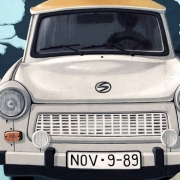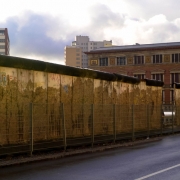The Poetic Justice Warrior Who Eternalized the Great Terror Behind the Berlin Wall – Anna Akhmatova
Thirty years ago this week the Berlin Wall came down. The catalyst was Soviet Premier Gorbachev ordering armed guards away from the wall. He had deluded himself to believe that socialism could exist without fear. The event was international news for several days, and it led to the fall of the Soviet Union and the reunification of Germany. Of course Poland’s courageous Solidarity labor movement led by Lech Walesa, the work of Pope John Paul II, and the extraordinary partnership of Britain’s Lady Margaret Thatcher and President Ronald Reagan (who implored Gorbachev in a 1987 speech at Berlin’s Brandenburg Gate – “tear down this wall!”), were also essential figures.
But for many people in the United States, this was a ho-hum course of events. For America’s intelligentsia and their ignorati, Reagan was still a B movie actor and socialism was the dominant philosophy of America’s national media and universities. Josef Stalin’s Great Terror in Soviet Russia was not taught in schools, and neither was Mao Zedong’s Cultural Revolution in China. Only Hitler’s Final Solution was well known, and that is because Nazism was rebranded by western intellectuals as right wing fascism so western socialists could distance themselves from the 20th century depravity they shared with their comrades.
It is upon this anniversary that we introduce the Poetic Justice Warrior who witnessed, and personally experienced, the Great Terror. She swore to its victims that their story would be told for future generations to know and understand. She is the great Russian poet, Anna Akhmatova.
Requiem
In 1940, Akhmatova wrote a collection of poems titled Requiem. They eloquently express her personal raw emotions and those of the women whose husbands, sons, brothers and fathers became the subjects of Stalin’s mass imprisonment. They were artists, poets, and publishers after all. For example, her son had been arrested on numerous occasions for alleged “counter-revolutionary activity,” and she would cue for many hours, many times, in an attempt to deliver food to him and plead with his captors.
By 1938, Akhmatova had become a well known poet in Russia, and on one of these occasions outside a St. Petersburg stone prison she met a woman:
One day somebody in the crowd identified me. Standing behind me was a woman, with lips blue from cold, who had, of course, never heard me called by name before. Now she started out of the torpor common to us all and asked me in a whisper (everyone whispered there): ‘Can you describe this?’ And I said: ‘I can.’ Then something like a smile passed fleetingly over what had once been her face.
This became Akhmatova’s inspiration and motivation for writing Requiem, but she dared not publish it. Instead she memorized it and shared it only with close friends. Requiem was finally published in 1963, without her consent, in Munich, Germany. This was two years after the construction of the Berlin Wall.
In hindsight, Requiem may not have survived to foretell the Berlin Wall’s ominous presence, or celebrate its glorious crumbing, if she had published it instead of memorizing it. In 1993, it was revealed that Akhmatova had been under investigation by the intelligence agencies of the deep state. They had bugged her apartment and kept her under constant surveillance. Stalin’s spies had created a dossier that totaled 900 pages of “denunciations, reports of phone taps, quotations from writings, and confessions of those close to her”.
In this excerpt from Requiem, she expresses a few of the emotions that surrounded her in 1938. These included disbelief, rationalization, stunned grief, agony, deep mourning, and perseverance. All of which Akhmatova cycles through this set of poems.
For seventeen months I have been screaming,
Calling you home.
I’ve thrown myself at the feet of butchers
For you, my son and my horror.
Everything has become muddled forever –
I can no longer distinguish
Who is an animal, who a person, and how long
The wait can be for an execution.
Anna’s close friend, Lydia Chukovskaya, was also a dissident author and poet, and wrote about the tactics of their small trusted circle of friends who would create poetry and distribute it. The ritual was for them to write poems for each other on a scrap of paper, read it, memorize it, and burn it in a stove. Oral circulation was their mode of publishing, or as Chukovskaya describes, “It was like a ritual. Hands, matches, an ashtray. A ritual beautiful and bitter.” This was done while casually conversing in code for the electronic eavesdroppers and quieltly memorizing:
Silent flows the river Don
A yellow moon looks quietly on
Swanking about, with cap askew
It sees through the window a shadow of you
Gravely ill, all alone
The moon sees a woman lying at home
Her son is in jail, her husband is dead
Say a prayer for her instead.
In Akhmatova’s own words, Requiem was “One hundred million voices shouting through her tortured mouth.” And “A poem without a hero.” All for the inhuman ideals of socialism.
Requiem’s Hero
As poetic justice would have it, Requiem was published for the first time in Russia in 1987, two years before Berlin’s monument to fear was torn down. It’s existence had proved that the Soviet empire was not founded on a Marxist ideal for a better society. There’s no such thing, Lenin and Stalin knew it, that was merely a ruse for western intellectual suckers. Nobel prize winning Polish poet Czeslaw Milosz also proves it in his book about the mental anguish suffered by Soviet propagandists, The Captive Mind.
Lenin never visited his proletarian workers at their factories and Stalin’s ideal was the ratting out of everyone by everyone. In today’s China, the ruling elite’s reverence for so-called Marxist ideals is as insincere and unbelievable as America’s Democratic leadership’s reverence for Constitutional principles and Christian values. The idea that their democratic socialism can be implemented without the fear of violence cruelly avoids reality.
After regularly reading to Russian soldiers in military hospitals during World War II, Akhmatova was condemned in 1946 by Stalin’s Central Committee, along with others, for bourgeois, individualistic writing and expelled from the Union of Soviet Writers.
From Requiem’s section titled The Verdict:
The word landed with a stony thud
Onto my still-beating breast.
Never mind, I was prepared,
I will manage with the rest.
I have a lot of work to do today;
I need to slaughter memory,
Turn my living soul to stone
Then teach myself to live again. . .
Thanks to the smashing of the Berlin Wall thirty years ago, the people of Poland, Estonia, Latvia, Lithuania, East Germany and the rest of the Soviet orbit have the opportunity to teach themselves to live again. The self-reliance of the bourgeois individualists idealized in the poetry of Poetic Justice Warrior Anna Akhmatova are Requiem’s heroes. They are the ones victimized by the force of socialism in Soviet Russia and the freedom fighters armed with reason, purpose, and pride who ripped away the iron curtain. When celebrating the fall of the Berlin Wall, it is imperative to know and understand the people and events behind it.





